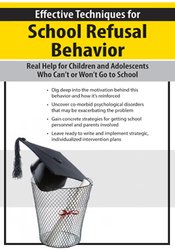

“I don’t want to go to school!” Who hasn’t heard that phrase before? While we may chuckle remembering the lengths we might have taken to avoid school, there are many children and adolescents whose struggles with school are much deeper and demand more urgent attention. They are exhibiting school refusal behavior, and their actions signal that something is very wrong.
School refusal behavior is often associated with co-morbid disorders such as anxiety or depression and has far-reaching and long-term consequences. School refusersmay have serious problems with nightmares, temper outbursts, poor academic performance, stunted social skill development, and even physical ailments.
In this unique slant on an often-misunderstood phenomenon, Dr. George Haarman will show you how to simultaneously address two competing demands when treating school refusal— immediately meeting attendance expectations set by the schools while also digging deeperto uncover and treat underlying problems.
You will be able to more quickly differentiate school refusal from common phobic reactions by recognizing and addressing the presence of anxiety, depressive, and other disorders that may be co-morbid or causing school refusal. Armed with a better understanding of the particular motivation and reinforcement systems related to the school refusal behavior, you can then offer strategic, individualized intervention plans that have a much greater chance of success.
| File type | File name | Number of pages | |
|---|---|---|---|
| Manual - Effective Techniques for School Refusal Behavior (1.33 MB) | 72 Pages | Available after Purchase |

George B. Haarman, PsyD, LMFT, is a licensed clinical psychologist and a licensed marriage and family therapist with over 40 years of experience working in a variety of settings, including private practice, youth detention centers, juvenile group homes, child protective services, and juvenile probation. Dr. Haarman completed basic and advanced supervisor training required by the Kentucky Board of Psychology Examiners and maintains approval by the board to act as a supervisor. In his private practice, Dr. Haarman has provided clinical supervision to clinical and counseling practicum students as well as consultation about clinical supervision to psychologists for over 25 years. He is a national speaker on clinical supervision, depression, school refusal, ADHD, emotional disorders in children and adults and the DSM-5®. He is the author of three books: Clinical Supervision: Legal, Ethical, and Risk Management Issues, School Refusal: Children Who Can’t or Won’t Go to School, and Mastering DSM-5®. Dr. Haarman received his doctorate in clinical psychology from Spalding University in 1989. He has been an instructor at Jefferson Community College, Bellarmine University, and Spalding University.
Speaker Disclosures:
Financial: Dr. George Haarman maintains a private practice and is an adjunct professor Spalding University, Jefferson Community College, and Bellarmine University. He receives a speaking honorarium and recording royalties from PESI, Inc. He has no relevant financial relationships with ineligible organizations.
Non-financial: Dr. George Haarman is a member of the American Psychological Association and the Kentucky Psychological Association.
Truants or Refusers
The importance of Assessing WHY They Aren’t in School
Strategic Interventions that Get Refusers Back in School, and Keep Them There
Getting School Personnel and Parents Involved
Please wait ...